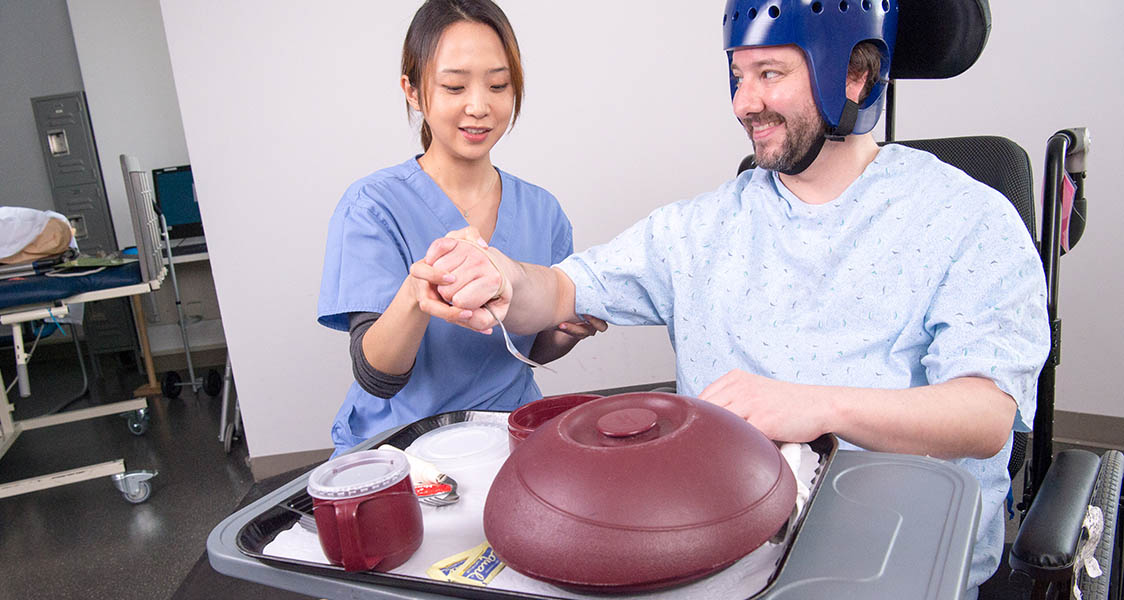Traumatic brain injury (TBI) affects how the brain works and is a significant cause of death and disability in the U.S. It is a broad term that includes a vast array of brain injuries, whether to a small area of the brain or multiple regions of the brain. The effects of a TBI can be mild, with temporary symptoms, or severe, leading to lifelong disability or death.
When the head receives a sudden blow or violent shake, the brain may hit the inside of the skull, damaging brain cells and causing a traumatic brain injury. TBI may also occur when an object strikes the head, or an object penetrates brain tissue, such as a bullet or a shattered piece of skull.
Facts about traumatic brain injuries:
- Each day about 176 Americans die from TBI-related injuries.
- Each year, roughly 233,000 Americans are hospitalized with TBI.
- Concussions are the most common type of traumatic brain injury.
- Among youth, approximately 15% of high school students report a sports-related concussion yearly.
- Adults 75 and over account for the highest percentage of TBI injuries and deaths.
- Men are twice as likely as women to be hospitalized with a TBI.
- Almost half of TBI-related hospitalizations are due to falls. [1]
What causes the symptoms of a traumatic brain injury?
In response to cell damage from impacting the skull, the brain changes how it uses chemicals or energy. These changes may cause symptoms such as headaches, light and sound sensitivity, and mental confusion. In mild TBIs, symptoms caused by these changes typically disappear in a short time and cause no apparent lasting damage or disability. In more severe or frequent TBIs, these changes can cause significant damage and last for months or years.These effects can also cause the brain to swell and lead to even more injury and sometimes death. [2]
What are the symptoms of traumatic brain injury?
Depending on the severity of the TBI, symptoms may be mild or disabling. They may appear immediately after the injury or days or weeks later. They include:
- Headache (persistent or occasional)
- Nausea
- Vomiting
- Seizure
- Fatigue or extreme sleepiness
- Dilation of one or both pupils of the eyes
- Loss of consciousness
- Dizziness or balance difficulties
- Breathing problems
- Weakness or numbness in fingers or toes
- Memory or concentration problems
- Confusion and intellectual problems
- Slurred speech or problems with communication
- Mood instability, depression, and other emotional and behavioral changes
- Sensory issues such as sensitivity to light or sound, blurred vision, tinnitus, or loss of sense of smell
The most common causes of a TBI are:
Falls down steps, from a ladder, or in the bath. These are the most frequent causes of TBI in older adults and children.
Vehicle accidents. Car and truck collisions, motorcycle accidents, bicyclists colliding with cars, and automobiles hitting pedestrians.
Violence from gunshot wounds, assaults, or violent shaking that whips the head back and forth.
Sports injuries in high-impact sports like football, soccer, boxing, lacrosse, hockey, and other sports. This is most common in children and adolescents.
Being struck by an object, such as in a construction site accident.
Explosive blasts or combat injuries caused by penetrating wounds, shrapnel, falls, body collisions, and proximity to explosions. Prevalent among active duty service members.
How is traumatic brain injury treated?
Surgery, medicine, and various therapies are used to treat TBIs, depending on the type and severity of the injury and its symptoms. Treatment may include:
- Hospitalization to stabilize the patient and evaluate the extent of the injury
- Surgery to stop bleeding in the brain or reduce pressure from brain swelling
- Medications to manage symptoms
- Rest to allow the brain time to heal
- Counseling for emotional support
- Rehabilitation, including physical therapy, occupational therapy, speech therapy, cognitive therapy, and other therapies.
What are the long-term complications of TBI?
A moderate or severe traumatic brain injury can have long-term complications. But any TBI can lead to:
- Anxiety, depression, or PTSD
- Seizures
- Brain bleeds
- Increased risk of dementia and Alzheimer’s disease
- Increased risk of movement disorders
- Chronic traumatic encephalopathy (CTE) in athletes who receive multiple concussions over several years.
Can the brain recover after a TBI?
For the most part, once brain cells have been damaged and die, they do not regenerate. However, the brain is remarkably “plastic” and attempts to rewire itself begin shortly after the injury. Sometimes, other areas of the brain can take over the functions of the damaged cells. In other cases, the brain reroutes function and information around the damaged areas.
How long a patient’s recovery will be or how much function they’ll recover is unpredictable as every injury and brain are unique. If the TBI is mild, a patient can make a full recovery in a matter of weeks. If the injury is severe, recovery may be a lifelong process.
To learn about the Brain Rehabilitation program at GSPP Rehabilitation see our web page or call 877-969-7342.
[1] Traumatic Brain Injury & Concussion, Centers for Disease Control and Prevention.

